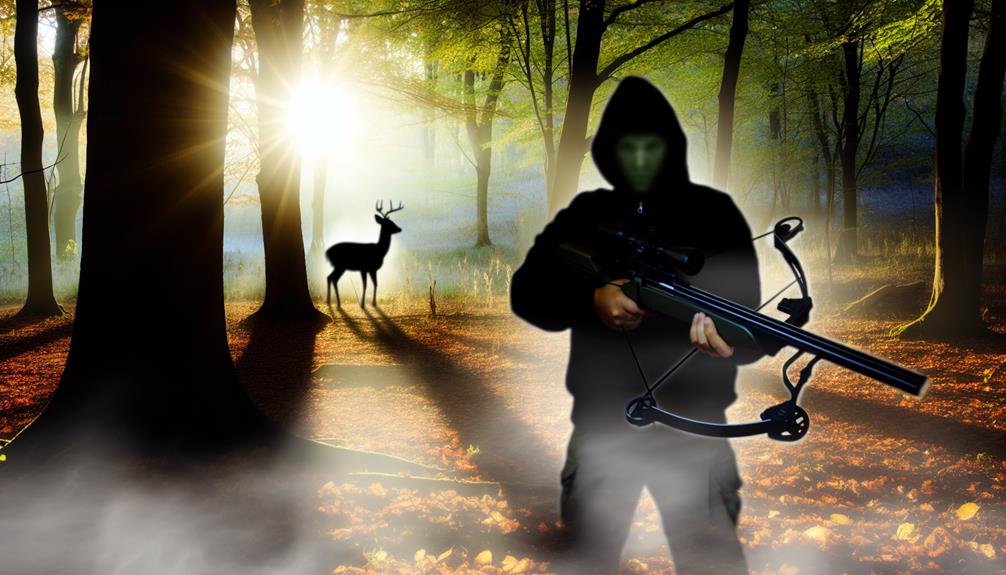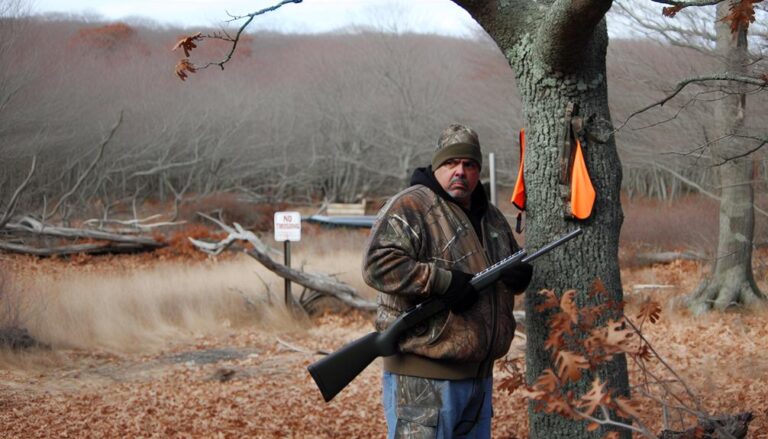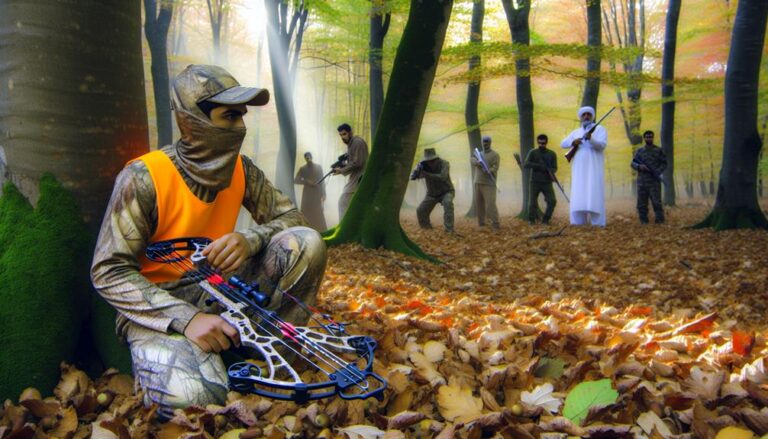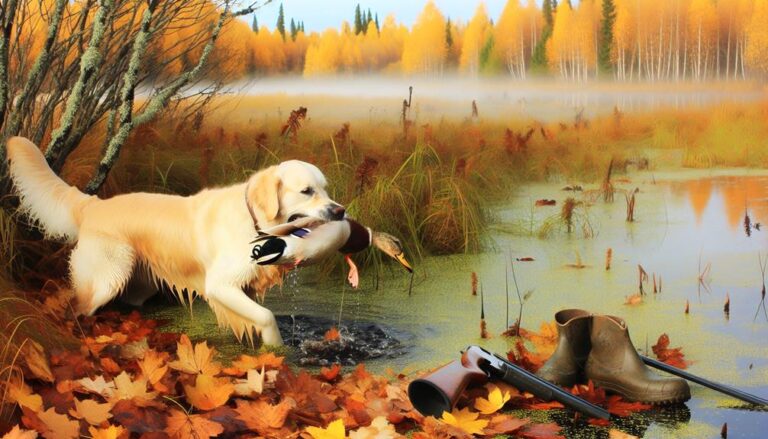Can a Felon Hunt With a Crossbow
Whether a felon can hunt with a crossbow depends on several factors. State laws vary, so you'll need to check your local regulations. Crossbows aren't classified as firearms, but some states still restrict their use by felons. You must obtain proper hunting licenses and comply with all hunting regulations. If you're on probation or parole, additional restrictions may apply. It's vital to consult legal experts or wildlife authorities for accurate information. Safety training and proper maintenance are essential for crossbow use. Remember, violating regulations can lead to serious consequences. By understanding the legal landscape and your specific situation, you can make informed decisions about hunting options.
Legal Status of Crossbows
When it comes to felons hunting with crossbows, you'll need to explore the legal status of these weapons in your state. Crossbows often fall into a unique category, as they're not typically classified as firearms. This distinction can be important for felons who want to hunt but are restricted from possessing firearms.
State laws vary significantly regarding crossbow possession and use by felons. In some states, you may be allowed to hunt with a crossbow even if you have a felony conviction. However, it's crucial to understand that compliance with hunting regulations is still necessary. You'll need to follow all rules about seasons, permits, and hunting areas.
To avoid legal issues, it's wise to consult with legal experts who specialize in your state's laws. They can provide clarity on whether you're permitted to possess and hunt with a crossbow as a felon.
State-Specific Regulations
Across the United States, you'll find a patchwork of regulations governing felons' rights to hunt with crossbows. Each state has its own set of rules, making it important for you to research the specific laws in your area if you're a felon interested in crossbow hunting.
Some states may allow felons to hunt with crossbows during certain seasons, while others might prohibit it entirely. It's your responsibility to understand these state-specific regulations before you pick up a crossbow.
Violating these rules can lead to serious legal consequences, potentially worsening your situation as a felon.
To make sure you're complying with the law, it's wise to consult with wildlife authorities or legal experts in your state. They can provide clarity on the current regulations and any restrictions that may apply to you as a felon.
Hunting License Requirements
For felons looking to hunt with a crossbow, obtaining the correct hunting license is a critical initial step. You'll need to comply with your state's specific regulations and requirements to legally participate in hunting activities. It's noteworthy that hunting laws can vary significantly from state to state, so you'll want to carefully research and understand the rules in your area.
When applying for a hunting license, you may face additional scrutiny as a felon. Some states might have specific restrictions on weapon use for felons, including crossbows. You'll need to be upfront about your status and make sure you meet all necessary requirements. This may involve providing additional documentation or completing extra steps in the application process.
Once you've obtained your hunting license, it's vital to follow all the rules and regulations associated with it. This includes adhering to any weapon restrictions that may apply to you as a felon. Failure to comply with these regulations can result in serious legal consequences.
Probation and Parole Considerations
If you're a felon on probation or parole, you'll need to be aware of specific restrictions regarding hunting with a crossbow. Your supervision conditions may limit your ability to possess or use weapons, including crossbows.
It's essential to check with your probation or parole officer about any regulations you must follow and obtain proper authorization before engaging in hunting activities.
Restrictions During Supervision
While on probation or parole, you'll face additional limitations that may restrict your ability to hunt with a crossbow. As a felon under supervision, understanding and complying with these legal restrictions is critical to avoid violating your probation terms. Your probation officer plays a vital role in determining what activities you can participate in, including crossbow hunting.
To ensure adherence to your supervision conditions, consider the following steps:
- Consult your probation officer about crossbow hunting limitations
- Request written approval for hunting activities
- Review your probation terms regarding possession of dangerous weapons
Keep in mind that special conditions of probation may forbid you from having or using dangerous weapons, which might encompass crossbows for hunting purposes.
It's important to communicate openly with your probation officer about your interest in hunting with a crossbow. They can offer clarity on the specific restrictions that pertain to your situation and advise you on the correct procedures to follow.
Weapon Possession Conditions
Weapon possession conditions play a significant role in determining whether you can hunt with a crossbow while on probation or parole. As a convicted felon, it's vital to understand that your probation or parole conditions may include specific restrictions on possessing dangerous weapons, which can include crossbows.
Your probation officer is a key resource in understanding these legal restrictions. Before engaging in any crossbow hunting activities, it's advisable to seek authorization from your probation officer. They can provide clarity on whether your specific conditions allow for weapon possession, particularly in the context of hunting.
Compliance with conditions is crucial. Special probation conditions may explicitly prohibit you from possessing weapons like crossbows, even for hunting purposes. It's important to remember that crossbows are often classified as dangerous weapons, which can complicate your ability to use them while under supervision.
To ensure you're not violating your probation or parole conditions, always communicate openly with your probation officer about your desire to hunt with a crossbow. They can guide you on the specific legal restrictions that apply to your situation and help you understand what activities are permissible under your current conditions.
Compliance With Regulations
Adhering to probation and parole regulations is important when you're a felon considering hunting with a crossbow. Your probation or parole conditions may include specific restrictions on weapon possession and hunting activities. It's essential to communicate with your probation officer to confirm compliance with these regulations.
Before engaging in any hunting activities, especially those involving crossbows, you should:
- Review your probation or parole terms carefully
- Seek authorization from your probation officer
- Understand the legal consequences of violating weapon possession restrictions
Remember that probation officers may have specific rules regarding the use of crossbows for hunting. They're responsible for overseeing your compliance with all conditions, including those related to weapon possession. By maintaining open communication with your probation officer, you can clarify any uncertainties about your ability to hunt with a crossbow.
Failure to comply with probation or parole conditions can result in serious legal consequences. It's always better to err on the side of caution and obtain explicit permission before participating in hunting activities.
Crossbow Safety and Training
For felons considering hunting with a crossbow, proper safety training is indispensable to guarantee responsible and lawful use of the weapon. Crossbow safety training covers vital aspects such as proper handling, usage, maintenance, and operation. You'll learn important shooting techniques and safety guidelines to prevent accidents and secure a safe hunting experience.
Understanding crossbow laws and regulations is another essential part of your training. This knowledge helps you stay compliant while engaging in hunting activities. By familiarizing yourself with local and state regulations, you'll be better equipped to hunt legally and responsibly.
Regular practice is key to improving your accuracy and proficiency with a crossbow. Spend time honing your skills at a designated shooting range or approved practice area. This will help you become more comfortable with the weapon and enhance your overall hunting performance.
Proper maintenance of your crossbow is indispensable for both safety and effectiveness. Learn how to clean, lubricate, and inspect your crossbow regularly. This will help ensure it functions correctly and reliably during your hunting trips, reducing the risk of malfunctions or accidents in the field.
Alternatives to Crossbow Hunting
If you're unable to hunt with a crossbow due to legal restrictions, there are several alternative options worth exploring. As a felon, you might explore primitive weapons or tools that don't fall under firearm restrictions. Many states allow hunting with muzzleloaders or airguns, which could provide viable alternatives for your hunting pursuits.
To ensure you're staying within the bounds of the law, it's important to understand state-specific regulations on alternative hunting methods. Consulting with a legal expert can provide valuable insights into your available hunting options. They can help you navigate the complexities of state laws and identify legal ways to continue your hunting activities.
Here are three alternative hunting methods to ponder:
- Muzzleloaders: These traditional firearms are often exempt from modern firearm restrictions.
- Airguns: High-powered air rifles can be effective for hunting small to medium-sized game.
- Primitive weapons: Tools like atlatls or spears may be allowed in some areas.
Restoration of Hunting Rights
The path to regaining your hunting rights as a felon isn't always straightforward, but it's possible in some states. As a convicted felon, you may be able to have your hunting rights restored, allowing you to hunt with a crossbow. However, it's vital to understand that this process varies depending on state laws and may come with specific conditions or waiting periods.
If you're interested in restoring your hunting rights, you'll need to research your state's regulations carefully. Each state has its own set of rules and procedures for felons seeking to regain their hunting privileges. You may be required to complete certain steps, such as waiting for a specific period after your conviction or meeting probation requirements.
It's important to adhere to all regulations and conditions set forth for the restoration of your hunting rights. To make sure you're following the correct process, consider consulting with legal experts or your probation officer. They can provide guidance on the specific steps you need to take and help you navigate any potential obstacles.
Penalties for Violations
Understanding the penalties for violations is vital when you're a felon considering hunting with a crossbow. As a felon, you must adhere to specific hunting regulations and legal requirements to avoid serious consequences. Violating these rules can result in fines, penalties, or even legal action against you.
To guarantee compliance and stay on the right side of the law, it's important to:
- Familiarize yourself with local and state laws regarding crossbow possession and use
- Obtain proper permits and licenses before engaging in any hunting activities
- Follow all hunting season restrictions and regulations specific to crossbows
Remember that possessing a crossbow during rifle season or other hunting activities may have specific legal restrictions for felons. It's your responsibility to understand and follow these laws to avoid potential repercussions.
Penalties for violations can range from monetary fines to more severe consequences, such as revocation of hunting privileges or even criminal charges.
Ethical Considerations
As a felon, you have the opportunity to demonstrate responsible behavior through ethical hunting practices with a crossbow. You'll need to handle the weapon safely and responsibly, showing that you're committed to rehabilitation and can be trusted with this privilege.
Your actions in wildlife conservation and adhering to hunting regulations can positively impact both your personal growth and the environment.
Second Chances for Rehabilitation
For many felons, hunting with a crossbow offers a valuable second chance at rehabilitation and reintegration into society. This opportunity allows them to engage in lawful and ethical outdoor activities while reconnecting with nature. As crossbows are classified as non-firearm weapons in many states, they provide a legal avenue for felons to participate in hunting.
To make the most of this second chance, you should:
- Research your state's specific regulations regarding felons and crossbow hunting
- Obtain any necessary permits or licenses required for hunting in your area
- Join a local hunting club or organization to learn proper techniques and safety measures
Understanding and following state regulations is essential when pursuing this rehabilitation opportunity. By engaging in crossbow hunting, you can develop new skills, build a sense of responsibility, and contribute to wildlife conservation efforts. This activity can also help you establish positive connections within your community and demonstrate your commitment to leading a law-abiding life.
Remember that crossbow hunting isn't just about the sport itself; it's a chance to prove your ability to follow rules, respect nature, and make ethical decisions. By embracing this opportunity, you're taking an important step towards personal growth and successful reintegration into society.
Responsible Weapon Handling
Responsible weapon handling is fundamental for felons who choose to hunt with crossbows, encompassing both ethical and safety considerations. As a felon, you must prioritize the secure storage of your crossbow to prevent unauthorized access. This not only guarantees your compliance with state laws but also promotes responsible weapon handling practices within your community.
To hunt ethically and legally with a crossbow, you'll need to familiarize yourself with and follow your state's specific laws and regulations. Proper training and education are essential for developing the skills necessary to handle a crossbow safely and effectively. By investing time in learning about crossbow use, you'll be better equipped to make ethical decisions while hunting.
Ethical considerations extend beyond legal compliance. As a felon hunter, you have a responsibility to respect wildlife, adhere to hunting guidelines, and use your crossbow safely. By doing so, you contribute to a positive image of hunters in your community.
Remember that responsible weapon handling and ethical hunting practices are ongoing commitments. Continuously educate yourself on best practices and stay informed about any changes in regulations to ensure you're always hunting responsibly and ethically with your crossbow.
Wildlife Conservation Impact
Beyond responsible weapon handling, felons who hunt with crossbows can play a significant role in wildlife conservation efforts. By engaging in responsible hunting and regulated practices, you can contribute to ecosystem balance and population control.
Ethical considerations are essential when participating in crossbow hunting, including adhering to hunting laws and practicing humane harvesting techniques.
Your involvement in wildlife management through crossbow hunting can have a positive impact on conservation efforts. Here are three ways you can contribute:
- Follow local hunting regulations and quotas to help maintain healthy wildlife populations
- Report any illegal hunting activities or environmental concerns to authorities
- Participate in local conservation groups or initiatives that support wildlife habitats






